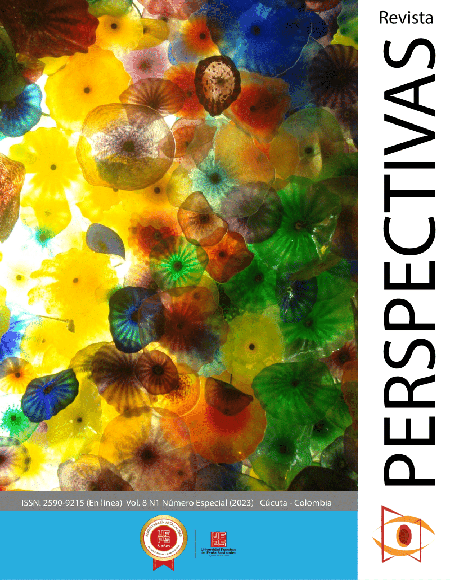Social perceptions of migration in a human settlement in a border zone.
Percepciones sociales sobre migración en un asentamiento humano en zona de frontera
Main Article Content
This article unfolds under the results of the research entitled Social perceptions about migration in the La Fortaleza neighborhood of the municipality of San José de Cúcuta. Attached to the macro-project of the Faculty of, Education, Arts, and Humanities, of the Francisco de Paula Santander University, entitled "Migration: poverty, development, and psychosocial factors". The objective of which was to analyze the social perceptions about migration in a human settlement in a border area, therefore, it was opportune to examine it from a qualitative paradigm, starting from a phenomenological approach that allowed having a holistic vision of a specific social reality such as Colombian-Venezuelan migration, becoming a topic of great relevance for the study of Social Sciences, likewise, obtaining as a result that social perceptions about migration are exposed to be the population movement from one country to another and the search for opportunities. In addition, that migration is a dominant immunization that immunizes forced coexistence that causes inclusion problems and social stigmas or is a favorable process that allows the increase of social support. Additionally, they perceive migration as family disintegration, social stigmatization, poorly paid work, or unemployment. Finally, the conclusions state that migration generates significant changes in the family, social and cultural nucleus of the individuals who emigrate and the recipients, on the other hand, appropriate measures are needed regarding their duties and rights in the countries who migrate, jointly social education is needed for issues such as social stigmatization or xenophobia.
Downloads
Article Details
Álvarez, I. (2012). Mirando al norte: Algunas tendencias de la migración latinoamericana. FLACSO.
Banco Mundial. (2018, 02 de noviembre). Migración desde Venezuela a Colombia: impactos y estrategia de respuesta en el corto y mediano plazo. Recuperado de https://www.bancomundial.org/es/events/2018/10/25/migracion-desde-venezuela-a-colombia
Blasco, J., & Pérez, J. (2007). Metodología de investigación en educación física y deporte: Ampliando Horizontes. Editorial Club Universitario.
Cárdenas, R., & Ortega, F. (2019). Transmisión del trabajo reproductivo familiar hacia las mujeres migrantes. Vulnerabilidad, violencia e invisibilidad dentro del trabajo doméstico. Collectivus, 6(2), 105-109. DOI: https://doi.org/10.15648/Coll.2.2019.7
Castillo, W. (2020). Análisis de las políticas públicas migratorias sobre la población migrante venezolana en la ciudad de Cúcuta (Tesis de maestría, Universidad Nacional Abierta y a Distancia). Recuperada de https://repository.unad.edu.co/bitstream/handle/10596/38442/wycastilloj.pdf?sequence=1
Castillo, T., & Reguant, M. (2017). Percepciones sobre la migración venezolana: causas, España como destino, expectativas de retorno. Migraciones. Revista del Instituto Universitario De Estudios Sobre Migraciones, (41), 133–163. https://doi.org/10.14422/mig.i41.y2017.006 DOI: https://doi.org/10.14422/mig.i41.y2017.006
Castro, A. (2018). La gobernanza internacional de las migraciones (De la gestión migratoria a la protección de los migrantes). Universidad Externado de Colombia.
Coronel, F. (2013). Efectos de la migración en el proceso de aprendizaje-enseñanza y su tratamiento desde la escuela. Integra Educativa, 6(1), 57-77.
Figueroa, E., Gonzalez, O., Pérez, M., & Espinosa, L. (2012). Ánalisis del desempleo, la migración y la pobreza en México. Mexicana de Agronegocios, 30, 835-847.
Galvis, D., Sierra, O., Toloza, C., & Zambrano, M. (2020). Movildad humana: venezolanos en Cúcuta y Villa del Rosario, su satisfacción en el territorio. Económico Revista Científica, 23(55), 259-284. DOI: https://doi.org/10.22395/seec.v23n55a12
González, J., & Setién, M. (2005). Diversidad migratoria (Distintos protagonistas, diferentes contextos. Universidad de Deusto.
Jaimes, M. C., & Galvis. L. N. (2020). En tiempos de covid-19, volver a la esencia, una mirada desde el Trabajo Social. En Ayala, E. T., L. K. Coronel., G. A. Espinel, L. N. Galvis., L. Y. Hernández, M. C: Jaimes., E, G. Osorio, B. J. Pérez & J. E. Urbina, El covid-19 y la reinvención del mundo: Perspectivas mutantes de existir y habitar en pandemia (pp. 129-156). Nueva Jurídica.
Martínez, M. (2004). Los grupos focales de discusión como método de investigación. Recuperado de http://www.edumargen.org/docs/2018/curso36/unid04/apunte01_04.pdf
Mayorga, A. C. (2019). Percepción ciudadana frente a la migración venezolana: Bogotá (2016 – 2019). Recuperado de http://hdl.handle.net/20.500.12010/7673
Parra, K. (2017). Aplicación del método fenomenológico para comprender las reacciones emocionales de las familias con personas que presentan necesidades educativas especiales. Revista de Investigación, 41(91), 99-123.
Rodríguez, S. (2017). ¿Migrantes económicos o refugiados? proyección internacional de las personas que huyen de la pobreza extrema pobreza en contextos de grandes desplazamientos. EntreTextos, (27), 171-187. DOI: https://doi.org/10.59057/iberoleon.20075316.201727268
Rebolledo, T., & Rodríguez, R. (2019). Mujeres migrantes, vulnerabilidad y Derechos Humanos. Collectivus, 6(2), 59-69. DOI: https://doi.org/10.15648/Coll.2.2019.4
Salazar, J. Montero, M., Muñoz, C., Sanchéz, E., Santoro, E., & Villegas, J. (2015). Percepción Social. En Psicología Social (pp. 77-109). Trillas.
Sanz, N., & Valenzuela, J. M. (2016). Migración y Cultura. Unesco.
Sthepen, C. (2010). Migración irregular: Causas, tipos y dimensiones regionales. Migración y Desarrollo, 15(7), 49-80. DOI: https://doi.org/10.35533/myd.0815.sc
Tonon, G., Alvarado, S., Ospina, H., Lucero, P., Botero, P., Luna, M., & Fabris, F. (2013). Reflexiones LatinoAmericanas sobre investigación cualitativo. Universidad Nacional de la Matanza.
Vera, M., Gonzales, S., & Alejo, J. C. (2011). Migración y educación: Causas, efectos y propuestas de cambio para la situación actual de migración escolar. Fundición PIEB.
Zambrano, M., Manzano, D., Pinzon, C., & Marulanda, C. (2011). Análisis del capital social en la frontera Norte de Santander- Táchira. Mundo FESC, 11(21), 182-194.
.







